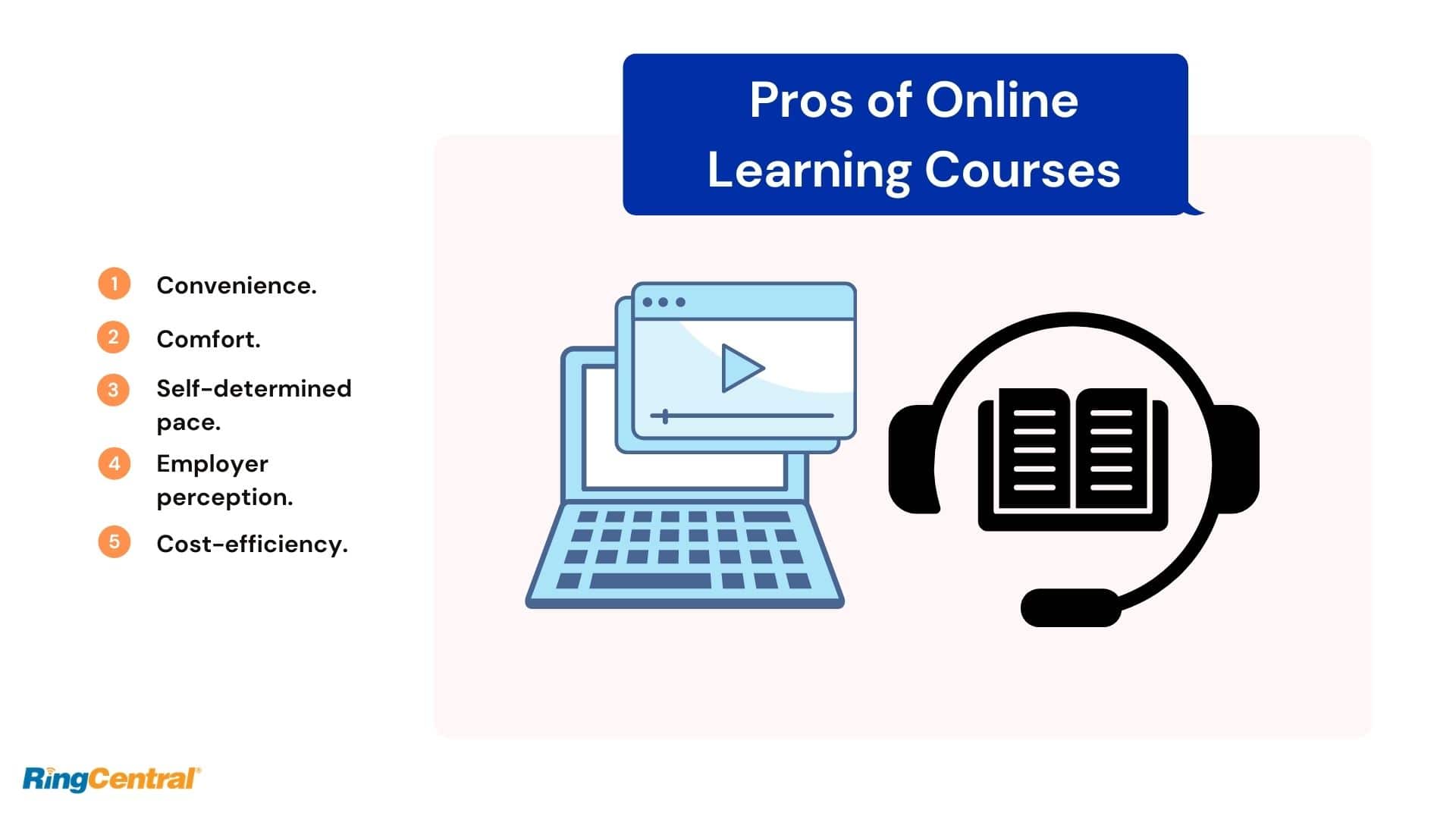The rise of the internet has changed a great deal about our daily routine. Not to mention the recent Covid-19 outbreak. The way we communicate with one another, how we work (especially since the advent of remote working), and how we buy everyday essentials are just some of the things transformed by the web. What’s also changed is the way we learn. Online learning courses are proving increasingly popular, allowing people to learn remotely at their own pace.
Now, some of the world’s leading educational institutions offer distance learning courses (and, indeed, there are higher education institutions solely dedicated to online learning). It’s not hard to see why so many people are choosing distance learning – it gives them the opportunity to learn from home so that they can fit their studies around their work and domestic routine. This is particularly convenient for people with young families to look after.

There are courses available in a huge range of subjects, from mental health to data science, and project management to other CPD courses. And millions of people around the world have made use of them. Whether you’ve got your heart set on a career change or you simply want to expand your understanding of the world around you, there are so many learning courses that you’re sure to find one to suit you. Online learning is, it appears, just one more part of our ‘new normal’.
So, in this guide, we’ll take a closer look at what online learning courses are, and what they could offer you both in terms of future career prospects and personal satisfaction. We’ll discuss the pros and cons of online learning, and we’ll give you some suggestions about what to look for when choosing an online course. Then, we’ll provide you with some handy tips to help you make the most of online distance learning courses. That’s whether you need free online courses for career development or help with virtual GCSE studies.
What Are Online Learning Courses?
Online learning courses are, as the name indicates, courses – many counting towards degrees or diplomas – which are undertaken predominantly or solely over the internet. These aren’t the only examples of high-quality courses, though, There are also many focus on specific topics like digital marketing or GDPR.
Where remote working involves working from home, remote learning involves learning from home. Technological advances have made online learning courses a practical and feasible option for people looking to learn new skills; as most of us now have access to reliable broadband connections, we can undertake online courses with relative ease. Getting started, too, can be as simple as doing a quick Google search.
However, there’s more to online learning courses than just watching streamed seminars or recorded lectures. A range of resources are used to deliver online distance learning courses; these include ebooks, quizzes, journals, question and answer sessions, and discussion forums. The exact methods used to deliver your course will depend on the type of course you take, the subject involved, and the institution through which you’re studying.

As we’ve noted, some institutions are online-only, so if you study at one of these, you won’t be required to travel for lectures, seminars, exams, or one-to-one discussions with tutors. However, there are some institutions that offer online courses that may require occasional attendance at an in-person seminar or lecture. Make sure you understand exactly what’ll be required of you before you choose the right course for you; don’t make any commitments you won’t be able to uphold.
Some courses are full-time and other short courses are part-time, so you should be able to find an option that works for your personal routine. Obviously, if you have young children or inflexible working arrangements, it can be difficult to accommodate an online learning course on top of all this. But, as we’ll discuss, flexibility is one of the major plus points of online learning, and you should be able to find something that works for you.
Online courses where you work towards an undergraduate or postgraduate degree will be subject to tuition fees (so you may need to take out a student loan to cover the cost). However, you may not be prepared to make this kind of commitment, and there are free courses that can help you bolster your knowledge and personal development. There are also professional and industry bodies which offer their own courses and qualifications.

Pros of Online Learning Courses
There are numerous reasons why online learning courses can be a practical choice for those looking to learn new things and work towards new qualifications in different subject areas. If there weren’t, they wouldn’t be so popular! But millions of people around the world sign up for their own online courses every year, which tells us something. Here, we’ll take a quick look at some of the leading advantages of taking distance learning courses online.

1. Convenience.
The most obvious benefit of choosing distant learning courses is that they’re so convenient. Committing to traditional university or education courses involves quite a lot of upheaval: it can involve uprooting yourself from your home and moving to an entirely new city. That’s okay for young people but isn’t always an option for everyone. That includes those in regular work, or with a young family to think about, as we’ve already discussed. Online education allows you to study from home, sparing you from having to relocate – with all the costs that would be involved in that.
2. Comfort.
As well as being convenient, studying online from home is also a lot more comfortable than attending in-person seminars and lectures. You don’t need to drag yourself into cold and draughty seminar rooms or lecture halls, sitting on uncomfortable plastic chairs for hours on end. Instead, you can settle into your favourite corner of your own home and take in a lecture from there. This also spares you the additional hassle of having to commute.

3. Self-determined pace.
In addition, there are many online learning courses that allow you to learn at your own pace. Not all training courses or online degrees are self-paced – again, you should always check carefully before you sign up to anything – but there are courses that are open-ended and allow you to determine your own learning schedule. This means you don’t have to drop everything else when you take a course: family life, work commitments, hobbies, socialising, and so on.
4. Employer perception.
Another benefit of taking online courses is that they look really good on a CV. When you apply for a job, employers are always looking for evidence that you’re willing to be flexible and learn new things. Taking a distance learning course is a good way of proving this. It’s also good if you’ve been through a period of unemployment, to show that you’ve not spent that time doing anything. If you can point to learning courses you’ve taken for CPD -continuing professional development – employers will be able to see that you’ve remained productive.
5. Cost-efficiency.
Finally, there are online courses that don’t require you to take out large student loans or pay expensive tuition fees. It all depends on the nature of what you’re looking to do – if you’re looking for an undergraduate or postgraduate degree, then you will have to pay (unless you can secure some sort of grant). However, there are lots of free online distance learning courses you can take which are both useful to you and also look good to prospective employers.
Cons of Online Learning Courses
All that said, however, there are also some downsides, and it’s important to take these into consideration before you sign up for any online distance learning courses. While online courses have grown rapidly in popularity over the last few years, the bulk of students stick to traditional courses. This isn’t necessarily the fault of online learning providers, but it does suggest that not everyone is yet convinced that they’re a viable alternative.
1. Impersonal.
Firstly, perhaps the most obvious downside of taking an online learning course as opposed to signing up for traditional studying, is that there’s a lot less face-to-face contact with tutors involved (indeed, for some courses there maybe none at all). For some, distance learning thus starts to feel like a bit of a monologue, with little in the way of any two-way exchange. It is possible to build good relationships with tutors and fellow students when learning remotely, but it requires a deliberate effort.

2. Judging providers.
Another problem is that it can be difficult to work out which distance learning institutions are reliable and which ones aren’t. A lot of long-established and widely trusted institutions (including some of the world’s most famous universities) provide distance learning courses. With other providers, though, it can be harder to determine whether or not they’re reputable. You must always do thorough research before signing up for any course.
Furthermore, it’s important to understand just what you’re getting into when you opt for online learning courses. Just because you’ll be doing it from home, that doesn’t mean there’ll be any less work involved. In fact, there’s likely to be more of it, as distance learning courses often involve more reading and assignments than ordinary classes. You may be required to spend 15-20 hours per week on your course, so make sure you’re prepared for this if you do decide to go ahead.
3. Self-motivation.
Related to the above point, learning remotely requires genuine commitment. You have to have a generous capacity for self-motivation and self-direction because there won’t be tutors around to keep a close eye on you. You must be prepared to be proactive when it comes to doing the necessary research, and you’ll also need to be good at managing your time. That means providing enough time for studying and research alongside your general daily routine.
Who Can Take Online Learning Courses?
The great thing about online learning courses is that pretty much anyone can take them on. Whether you’re 18 years old or 80, distance learning is an option that works for a lot of people. As we’ve discussed, they’re particularly convenient for people at work and with young children to look after. Whereas traditional learning very often requires you to relocate, you can instead learn remotely and take care of all those other day-to-day obligations.
Although online learning courses are open to just about anyone, they’re particularly convenient for working-age people, for the reasons we’ve already outlined. They offer the kind of flexibility people need when fitting study around their work commitments. They also provide greater control over your learning path, and they’re generally a lot cheaper than regular degrees. They’re also good for career development, as employers often value them.
If you’re looking for online machine learning courses, for example, you shouldn’t have trouble finding one which you can fit around your current lifestyle. However, some courses may have specific entry requirements (such as an existing degree or a certain threshold of school exam results), so make sure you check these before you sign up.

What to Look for When Choosing an Online Learning Course
There are several things you should look for when working out which online learning course is right for you. Firstly, you need to take some time to explore which options are out there and think about which of those might be best suited either to your personal interests or your intended career path. There’s no point committing yourself to an online course unless you’re genuinely committed to it – otherwise, you’ll struggle to maintain interest.
In addition, you must also do thorough research about the institutions offering the relevant courses. Are they genuinely reputable? What can they offer you during your studies? Will potential employers look favourably on a qualification obtained from that institution? This should help you narrow down your options so that you can settle on one that’s genuinely right for you.
Also, you need to ascertain just how flexible the course in question is, and how effectively you’d be able to fit your studies around the rest of your regular routine. If you feel the requirements are excessive and you wouldn’t be able to accommodate them satisfactorily, you may be better off continuing your search and looking for another course elsewhere.
Tips to Make the Most Out of Online Learning Courses
When you take an online learning course, you have to take it seriously. It’s so important to treat it as you would any other course. If you treat it like it’s just a bit of a hobby or something to pass the time, you won’t get as much out of it. By signing up for a distance learning course, you’re making a commitment to see it through. So don’t succumb to the temptation of kicking the can down the road, otherwise you won’t reap the full rewards.

Learn how to practice effective time management. If you’re studying from home for the first time, you might find the experience a little strange at first. But you need to stay disciplined if you’re going to get the most out of your course. If you don’t have good time management skills, you could find that everything starts to get disorganised. Create a weekly schedule and set time aside for studying and writing. And if you have deadlines, you must ensure you stick to them.
Another important point to remember is that you must find ways of minimising distractions. A lot of people find that with online learning there are actually fewer distractions than being on campus (and there’s certainly some truth in this). For others, though, it can be harder to stay focused without having to attend in-person lectures and seminars. Create a quiet study space and make sure everyone else in the house knows not to disturb you while you’re working there. Also, this will help you keep your books and other materials in one place.
Conclusion
Online courses can be a great way of acquiring new knowledge in your own home, and at a pace that works for you. It can give you the flexibility you need to fit your studies around the rest of your everyday responsibilities. Of course, there are challenges involved – after all, online learning is something that’s relatively new for most people – and it’ll no doubt take some adjustments.
But if you are prepared to make the commitment to learn and stick to it, you could acquire useful new qualifications, broaden your horizons, and give yourself all sorts of new options in life.
Originally published Sep 08, 2020, updated Jan 17, 2023



